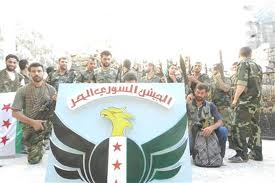 BRUSSELS, Belgium – A fierce row over whether to arm Syrian rebels fighting President Bashar al-Assad’s forces has left the European Union deeply divided days before the bloc needs to decide on renewing existing sanctions.
BRUSSELS, Belgium – A fierce row over whether to arm Syrian rebels fighting President Bashar al-Assad’s forces has left the European Union deeply divided days before the bloc needs to decide on renewing existing sanctions.
After months of bitter argument the issue comes to a head next week, with EU foreign ministers pressed for an answer at talks Monday, their last get-together before the expiry at midnight Friday of far-reaching EU sanctions against the Assad regime, including an arms embargo.
Britain and France want the arms embargo maintained against Assad but relaxed against the opposition Syrian National Coalition (SNC).
At best, they said, it would be lifted entirely for the rebels; at worst changed, with “some very serious amendment that allows us to send them more assistance.”
But other EU nations and aid groups are vehemently opposed to any change, citing the huge risks involved.
“Transferring more weapons to Syria can only exacerbate a hellish scenario for civilians,” said aid organisation Oxfam’s Anna Macdonald. “The UK and France are charting a risky course of action. Diplomacy should be the priority.”
After a flurry of negotiations, held daily at different levels over the past week as the May 31 deadline nears, Brussels diplomats and officials say the 27 EU nations have split into three groups over the question.
Should the bloc fail to agree a joint position by Friday, the whole sanctions regime including the arms embargo would lapse, allowing the delivery of weapons to both rebels and the regime.
“We haven’t taken the decision to supply arms but we believe member states should have the flexibility to do so,” said a UK diplomat who asked not to be identified.
Violently opposed to the demands by Britain and France, which appear to have lost the support of Italy and Spain, are Scandinavian nations led by Sweden as well as Austria and the Czech Republic.
They want the current sanctions regime simply rolled over as it stands on the grounds that more weapons will cause more bloodshed and could end up in the hands of the growing numbers of radical Islamists joining rebel ranks.
The third group of nations, some of whom complained of being held to ransom by Britain and France, are seeking a compromise to avoid an embarrassing EU split.
“It’s of paramount importance for the EU to come up with a common position,” said German Foreign Minister Guido Westerwelle on Friday.
“The worst would be to for Europe to show its divisions to Syria. That would likely very much please the Assad regime.
The EU’s diplomatic service, headed by Catherine Ashton, is cautioning capitals against “any counter-productive move” that could hamper current Russia-US efforts to relaunch peace talks in Geneva, expected to take place next month.
“This could call for allowing more time for reflection on the issue of lifting the arms embargo,” said an internal note that reflects moves by some nations to renew the sanctions for a short period, thus allowing time to see if the so-called “Geneva 2” takes off.
Of seven to eight options laid out by the EU’s diplomatic service, one likely compromise would be an agreement that EU states could provide the rebel coalition with arms but only those set out on an agreed list of lethal weapons.
Another suggestion would be to accompany supplies with safeguards to stop weapons ending up in the wrong hands, or to issue export licences on a case-by-case basis.
In a note to Ashton weeks ago, London and Paris argued that lifting the arms embargo against the opposition would put pressure on Assad to find a political settlement, rather than exacerbate war.
“It is only by increasing the pressure on the regime that we can help bring (Assad) to the negotiating table and keep open the prospect of a political solution,” said British Foreign Secretary William Hague and French Foreign Minister Laurent Fabius.
But EU officials close to the debate dub such moves to pressure Assad via threats of tipping the military balance as “simply naive”.
“The only threat capable of scaring Assad would be for Moscow or Tehran to threaten to cut off assistance,” one official told AFP on condition of anonymity.
ABS- CBN News

Leave a Reply
You must be logged in to post a comment.